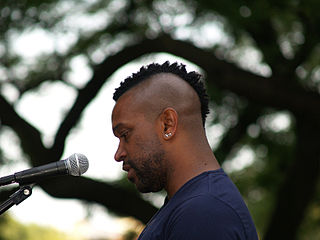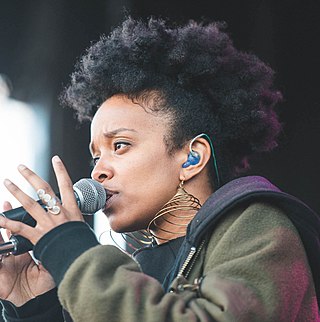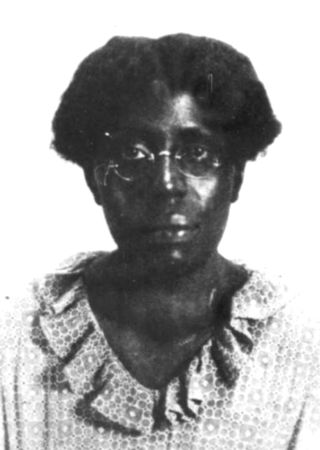Work
Brown has continued to participate in poetry slams, has performed her poetry across the United States, and often holds poetry workshops focused on writing poetry that heals. She's well known for performing in multiple venues such as the San Antonio Guadalupe Theater, Tucson Poetry Festival, and the San Francisco Opera Theatre. [7] [9] [10]
Brown writes poetry to uplift Black people and pay homage to her ancestors and the history of her people. [5] She wants to inspire and uplift disempowered communities through her poetry. [7] She also uses her poetry to validate Black girl rage. [9] She writes about the anti-Blackness within the Mexican community and advocates for Black Chicanx individuals. [11] Brown has been dubbed a "part-time curandera" because her poetry deals with healing issues of race, ethnicity, gender, class, and sexual orientation. [7] She weaves contemporary issues and tensions into her poetry. [3]
In 2021, Brown’s debut poetry collection “We Are Owed” was published, after six years of work. [12] [13] Jonathan Cortez, a Ph.D. recipient from the Department of American Studies at Brown University, describes the book's title as a “call to action, a demand, a recognition, a reparation, a reorientation, and a reclamation”. [14] Ali Black, a writer and poet based in Cleveland, Ohio, describes this collection as untraditional, as it combines poems, epigraphs, and “Brown’s college course notes from 2014 and 2015,” giving it the feel of both a diary and a history book. [12] In this collection, Brown explores the intersection of queer Black identity while navigating Mexican-American spaces. [13] Brown's poems also serve to reclaim and highlight the erased history of key Black historical figures, including Gaspar Yanga and Estevanico. [12] Brown has expressed frustration for having to rely on YouTube videos to learn about Black history. [15] For that reason, she dedicates several poems to Yanga, including "Letter to Yanga, from Six-Year-Old Ariana", where she requests that Yanga send her an image of himself. [12] She eventually comes to terms with her inability to "find an image of Yanga online" concluding "instead, I try harder to love my own face, nose, lips, hair". [12] She discusses the misrepresentation of Black Chicanx individuals in popular culture, such as in the game Lotería. [16] Brown also reflects on her study abroad experience in Mexico City, where she was the only Black person on the trip. [17] In Mexico City, she felt a sense of alienation from Latino culture due to the marginalization of Afro-Latinos and her difficulty engaging with the culture. [15] She highlights “the erasure of Blackness in Mexico within Mexicanidad” and addresses the violence faced by Afro-Latinos, including isolation and anti-Black sentiments. [15] [17]
In 2020, Ariana Brown published her poetry chapbook, Sana Sana. This is a collection of poems is an exploration of her lived experience as a Black woman, navigating queerness, love, life, and womanhood. Her book is an homage to the saying “Sana Sana, colita de rana, si no sana hoy, sana en la mañana. [18] ” Brown expresses that this book is a reflection of her writing towards healing. [19]
Her work has been featured in PBS, Huffington Post, Blavity, For Harriet, and Remezcla among others. [1]
Brown's poem "Inhale: The Ceremony" reflects her connection to her ancestors and addresses the often-unacknowledged history of Afro-Latinas. She notes that she is frequently racialized solely as Black, with her Latina identity overlooked, leading to feelings of isolation. Through her work, Brown aims to make these intersections visible, challenging historical narratives that have erased such identities.
In 2024, her work was included in Xican-a.o.x. Body, a comprehensive group exhibition on the experiences and contributions by Chicano artists in contemporary culture. The show was on view at the Cheech Marin Center for Chicano Art & Culture at the Riverside Art Museum, California, and later at the Pérez Art Museum Miami, Florida. [20] [21]
Ariana Brown's poem "A Division of Gods" delves into the complex interplay of identity, colonization, and historical memory during a visit to Templo Mayor in Mexico City. Through "A Division of Gods," Brown invites readers to confront the uncomfortable truths of colonization and its enduring impact on identity and cultural memory, urging a deeper understanding of the histories that shape our present.
Ariana Brown, a Black Mexican American poet, has openly discussed her complex relationship with identity and representation in her personal life. Born and raised in San Antonio, Texas, she is the daughter of an African American father and a Mexican American mother. Her experiences as a queer, Blaxican woman have heavily influenced her work, as she uses poetry to explore themes of racial identity, cultural politics, and the erasure of Blackness within Mexican communities. [22] [23]
Ariana Brown openly claims both her Black and Mexican lineages, despite facing anti-Blackness within the Mexican community. Brown recalls being called the 'n' word at the age of five and being told by her elementary school principal that her hair was 'outlandish' and distracting to other students.
Brown's deep interest in lineage and history stems from her father passing away before she was born, leading her to reflect on her heritage and the significance of ancestral connections. This focus on identity is evident in much of her work, including her debut chapbook Sana Sana and her poetry collection We Are Owed. Her poetry often addresses the intersections of race, ethnicity, and gender, and she speaks candidly about the challenges of finding her place in both Black and Latinx communities. [23] [24]
In addition to her literary pursuits, Brown is a part-time curandera, which reflects her focus on healing in her writing. She incorporates themes of emotional and spiritual healing, drawing from her experiences in poetry slams and her evolving understanding of history and identity. [22] [24]
Ariana Brown has become the role model she once needed by addressing the complexities of her identity through her poetry. Growing up, Brown struggled to find representations of Afro-Latina women from working-class backgrounds in literature and her community. This absence of relatable figures motivated her to create work that acknowledges and celebrates the intersections of her heritage.
In the interview titled "I belong in my community: A Conversation with Ariana Brown," poet Ariana Brown discusses the profound influence of community on her work and personal identity. Reflecting on her time in an MFA program at the University of Pittsburgh, Brown expresses a sense of disconnection from the academic environment, stating, "If anything, my time at Pitt reminded me that I do not belong in the university, nor do I want to be there. I belong in my community."
In high school, Brown found inspiration in the autobiography of Malcolm X, admiring how he used language to command attention and advocate for change. This realization led her to believe that mastering language could empower her to navigate the world effectively. She began writing poems that explored her experiences in a predominantly Mexican community, eventually performing on slam poetry stages.












